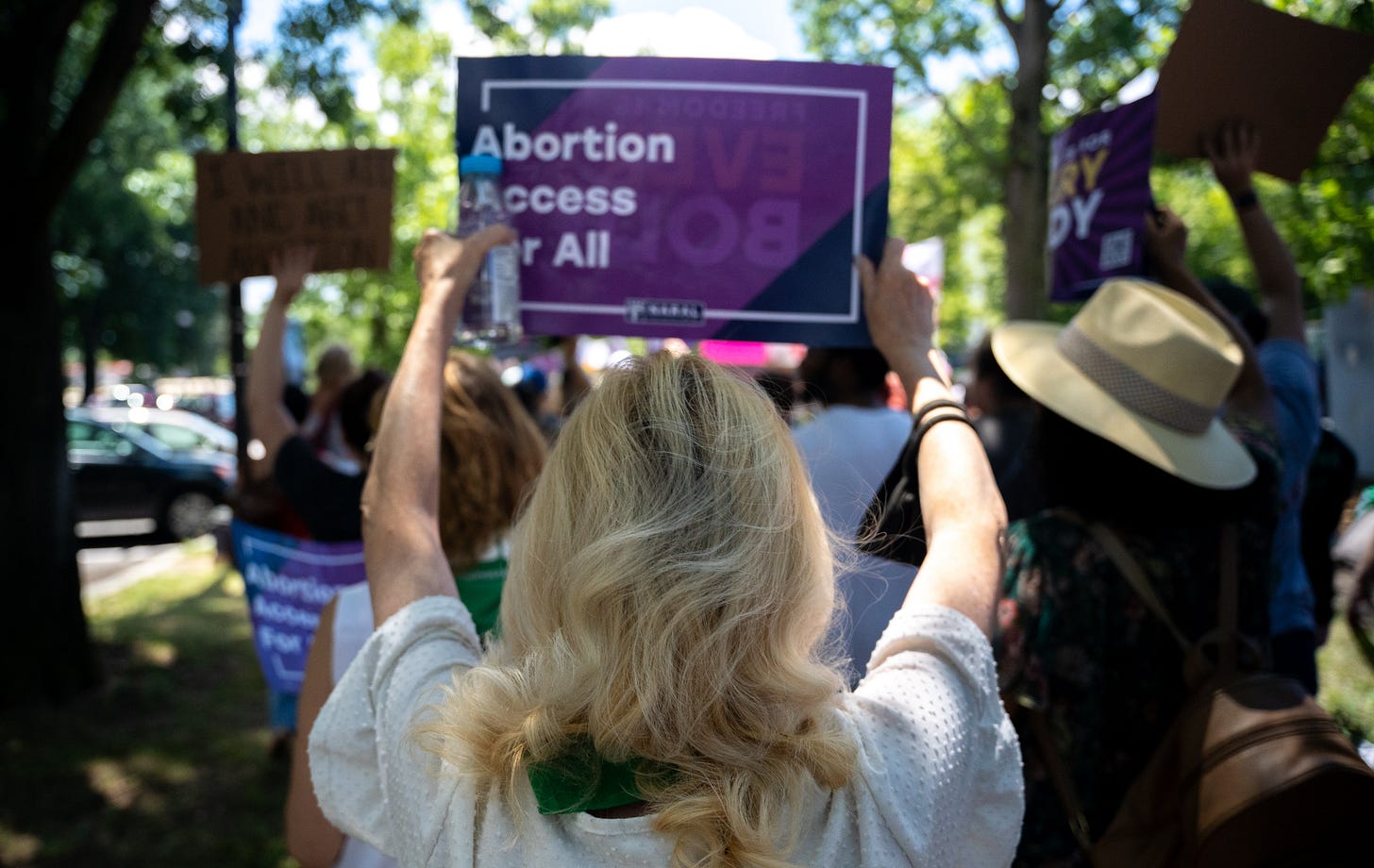On One Year of Being Less Than a Full Citizen

As Moira Donegan wrote in the Guardian, it seems “absurd” that it’s only been a year since the Dobbs decision overturned Roe v. Wade. That it is a nightmare from which I may never wake up is even more absurd.
Much of the coverage in the past year has focused on the most horrifying (and entirely predictable) outcomes of abortion bans. Young rape victims, those suffering miscarriages, those who’s pregnancy puts their own health or life at risk. These are the stories that are “easy” to tell because it seems clear to many (though not all) people that these are the women who should be “allowed” abortion care.
(For what it’s worth, it’s a trick of the human mind to believe we have moral and valid reasons for doing something we’d otherwise oppose. Abortion providers tell stories of conservative women who see no hypocrisy between their disapproval of abortion and their exercising that choice because they had a “good” reason.)
But women have many reasons for not wanting to be pregnant and “it might kill me” is not the only valid one. Restricting abortion access definitionally restricts the lives of women who would otherwise end a pregnancy. They get stuck in relationships they don’t want to be in, get stuck in jobs they don’t want, get pushed out of jobs they do want.
I believe women should have the right to abortion on the grounds of bodily autonomy alone – it is unfathomable to me that the state can compel someone to carry and bear a child against their will. But the impact on women’s ability to achieve what they want professionally and personally is something that is too easily dismissed by many, even those who are supposed to be on our side. When Democrats talked about abortion as being “safe, legal and rare” they were playing to this idea that there are good reasons and bad reasons to have an abortion. And a person who just doesn’t want to be a parent – whether this time or ever – is not a “good” reason, even to some who don’t necessarily believe abortion should be banned.
The trope you often hear from anti-choice activists is to imagine what that fetus could become. You may be aborting the next Mozart or Einstein, so the line goes. But this ignores the living, breathing, already-alive woman whose life will be irrevocably altered by remaining pregnant. Maybe she is the next Mozart or Einstein. For some people the potential life of a fetus has more value – is given more consideration – than the existing life of the woman who is meant to bear it. Alexandra Petri illustrates this impact in this gut-wrenching piece in the Washington Post.
To me this feels very reminiscent of #MeToo. In that instance we were asked, over and over and over, to think about the outcome for the man who is accused, not the impact on the woman (or, in most cases, many, many women) he harmed. And while these arguments were often wrapped in the pious formulation of everyone being innocent until proven guilty, they were just as easily and often made to defend men who’d admitted to wrongdoing. What price, we were repeatedly asked, should a man be meant to pay in cases that were so murky or impossible to prove because, by their nature, they happened in private, away from any potential witnesses? Or cases that weren’t “that bad.” (I’ll let you guess who gets to decide how bad is too bad.) The reflex to side with the men – what Kate Manne calls “himpathy” – was predictable and automatic. To this day plenty of people believe that the women terrorized by Harvey Weinstein, who was convicted of rape, knew what they were facing when they went into that meeting and chose to go anyway.
And what that reflex to protect the man – his career, his livelihood, his reputation – ignores is the many women whose careers, livelihoods and reputations were ruined by having come in contact with him. What movies never got made? What cures were never invented?
But that’s the thing, and it’s what I’ve been grappling with for more than a year now – too many people just don’t care. More precisely, they don’t believe that women’s contributions matter very much. If women’s lives and careers are derailed or outright ruined by rape, harassment, unwanted pregnancy – what of it? If you don’t think women matter very much then these impacts don’t matter very much at all.
If I had to say what has been the hardest for me this last year it is this simple understanding – that a good swath of our society does not think women’s lives matter all that much and are willing to go to incredible lengths to restrict and control us. Women can be stripped of rights, relegated to second-class status, not allowed the full autonomy that men enjoy because some people believe our lives just aren’t as important. We aren’t as valuable.
That I am seen as less-than by many people is not entirely new information and has always been both sad and frustrating to me. But now? Now it’s not just that some people believe I am less valuable than a man. They have turned that belief into laws that make me less than a full citizen. And that has been, all at once, terrifying, enraging and nausea-inducing.




